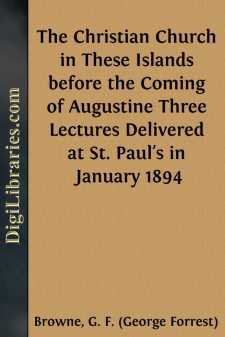Categories
- Antiques & Collectibles 13
- Architecture 36
- Art 48
- Bibles 22
- Biography & Autobiography 813
- Body, Mind & Spirit 142
- Business & Economics 28
- Children's Books 17
- Children's Fiction 14
- Computers 4
- Cooking 94
- Crafts & Hobbies 4
- Drama 346
- Education 46
- Family & Relationships 57
- Fiction 11829
- Games 19
- Gardening 17
- Health & Fitness 34
- History 1377
- House & Home 1
- Humor 147
- Juvenile Fiction 1873
- Juvenile Nonfiction 202
- Language Arts & Disciplines 88
- Law 16
- Literary Collections 686
- Literary Criticism 179
- Mathematics 13
- Medical 41
- Music 40
- Nature 179
- Non-Classifiable 1768
- Performing Arts 7
- Periodicals 1453
- Philosophy 64
- Photography 2
- Poetry 896
- Political Science 203
- Psychology 42
- Reference 154
- Religion 513
- Science 126
- Self-Help 84
- Social Science 81
- Sports & Recreation 34
- Study Aids 3
- Technology & Engineering 59
- Transportation 23
- Travel 463
- True Crime 29
The Christian Church in These Islands before the Coming of Augustine Three Lectures Delivered at St. Paul's in January 1894
Description:
Excerpt
LECTURE I.
Importance of the anniversaries connected with the years 1894-1897.—Christianity in Kent immediately before Augustine.—Dates of Bishop Luidhard and Queen Bertha.—Romano-British Churches in Canterbury.—Who were the Britons.—Traditional origin of British Christianity.—St. Paul.—Joseph of Arimathea.—Glastonbury.—Roman references to Britain.
We are approaching an anniversary of the highest interest to all English people: to English Churchmen first, for it is the thirteen-hundredth anniversary of the planting of the Church of England; but also to all who are proud of English civilisation, for the planting of a Christian Church is the surest means of civilisation, and English civilisation owes everything to the English Church. In 1897 those who are still here will celebrate the thirteen-hundredth anniversary of the conversion of Ethelbert, king of the Kentish people, by Augustine and the band of missionaries sent by our great benefactor Gregory, the sixty-fourth bishop of Rome. I am sorry that the limitation of my present subject prevents me from enlarging upon the merits of that great man, and upon our debt to him. Englishmen must always remember that it was Gregory who gave to the Italian Mission whatever force it had; it was Gregory who gave it courage, when the dangers of a journey through France were sufficient to keep it for months shivering with fear under the shadow of the Alps; it was Gregory who gave it such measure of wisdom and common sense as it had, qualities which its leader sadly lacked. Coming nearer to the present year, there will be in 1896 the final departure of Augustine from Rome to commemorate, on July 23, and his arrival here in the late autumn. In 1895 there will be to commemorate the first departure from Rome of Augustine and his Mission, by way of Lérins and Marseilles to Aix, and the return of Augustine to Rome, when his companions, in fear of the dangers of the way, refused to go further. An ill-omened beginning, prophetic and prolific of like results. The history of the Italian Mission is a history of failure to face danger. Mellitus fled from London, and got himself safe to Gaul; Justus fled from Rochester, and got himself safe to Gaul; Laurentius was packed up to fly from Canterbury and follow them; Paulinus fled from York. In 1894 we have, as I believe, to commemorate the final abandonment of earlier and independent plans for the conversion of the English in Kent, from which abandonment the Mission of Augustine came to be.
It is a very interesting fact that just when we are preparing to commemorate the thirteen-hundredth anniversary of the introduction of Christianity into England, and are drawing special attention to the fact that Christianity had existed in this island, among the Britons, for at least four hundred years before its introduction to the English, our neighbours in France are similarly engaged. They are preparing to celebrate in 1896 the fourteen-hundredth anniversary of “the introduction of Christianity into France,” as the newspapers put it. This means that in 496, Clovis, king of the Franks, became a Christian; as, in 597, Ethelbert, king of the Kentish-men, became a Christian. As we have to keep very clear in our minds the distinction between the introduction of Christianity among the English, from whom the country is called England, and its introduction long before into Britain; so our continental neighbours have to keep very clear the difference between the introduction of Christianity among the Franks, from whom the country is called France, and its introduction long before into Gaul. The Archbishop of Rheims, whose predecessor Remigius baptized Clovis in 496, is arranging a solemn celebration of their great anniversary; and the Pope has accorded a six months’ jubilee in honour of the occasion....



